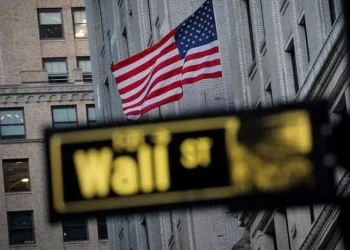Wall Street’s main indexes jumped on Friday, recovering some losses from the previous session, as Amazon’s strong earnings countered Apple’s weaker China sales and investors assessed a significant drop in U.S. jobs growth in October.
Amazon.com soared 6.5%, on track for its best day since February, as strong retail sales lifted its profit above Wall Street estimates.
Meanwhile, Apple dropped 0.5% despite beating quarterly sales forecasts, as investors worried about a decline in China sales.
Equity markets broadly overlooked weak U.S. October nonfarm payrolls data, given disruptions from hurricanes and strikes. The data showed an increase of 12,000 jobs, much smaller than economists’ estimate of a 113,000 rise.
However, the unemployment rate held steady at 4.1%, reassuring investors the labor market remained on a solid footing ahead of the U.S. presidential election.
“This doesn’t really change much in terms of what’s expected from a Fed standpoint, or thoughts around the slowing economy,” said Charlie Ripley, senior investment strategist for Allianz Investment Management.
After the data’s release, investors largely stuck to bets that the central bank would cut rates by 25 basis points in November as well as December.
Treasury yields eased following the labor report. They had risen to nearly four-month highs in recent weeks, pressuring equities.
Wall St slides as Meta, Microsoft warnings trigger fears over AI trade
U.S. October ISM manufacturing PMI was at 46.5, slightly below the 47.6 forecast.
The Nov. 5 U.S. election is on investors’ minds, with many analysts predicting a close race and some uncertainty over the final outcome. The Fed’s November meeting kicks off the following day.
Unsurprisingly, equity volatility has risen in recent days, with the CBOE Volatility Index trading around its highest in three weeks, though it eased slightly from Thursday’s nearly two-month high.
The Dow Jones Industrial Average rose 307.78 points, or 0.74%, to 42,071.24, the S&P 500 added 43.64 points, or 0.76%, to 5,749.09, and the Nasdaq Composite gained 190.38 points, or 1.05%, to 18,285.53.
All S&P 500 sectors gained ground, barring a slight dip in Utility stocks, while Amazon.com’s gains lifted the Consumer Discretionary index to a more than two-year high.
Cost warnings on AI-related infrastructure from Meta Platforms and Microsoft saw the Nasdaq tumble 2.7% in its worst day in nearly two months on Thursday.
“We’ll have to continue to watch to see if there’s a broader trend of slowdown for tech spending and the productivity that comes out of the sector,” Ripley said.
All three major indexes remained on track for weekly declines, with the S&P 500 and the Nasdaq Composite set for their worst week in eight.
Intel jumped 5.4% after a better-than-expected revenue forecast and lifted other chip stocks, with Nvidia rising 2.3%. An index of chip stocks was up
1.4%.
Oil majors also rose, with Chevron adding 4% after beating third-quarter profit estimates on higher oil output.
Shares of Boeing gained 2.4% after a union of striking workers endorsed an improved contract offer, with members expected to vote on Monday.
Advancing issues outnumbered decliners by a 4.15-to-1 ratio on the NYSE, and by a 2.45-to-1 ratio on the Nasdaq.
The S&P 500 posted six new 52-week highs and three new lows, while the Nasdaq Composite recorded 38 new highs and 39 new lows.
Wall Street’s main indexes jumped on Friday, recovering some losses from the previous session, as Amazon’s strong earnings countered Apple’s weaker China sales and investors assessed a significant drop in U.S. jobs growth in October.
Amazon.com soared 6.5%, on track for its best day since February, as strong retail sales lifted its profit above Wall Street estimates.
Meanwhile, Apple dropped 0.5% despite beating quarterly sales forecasts, as investors worried about a decline in China sales.
Equity markets broadly overlooked weak U.S. October nonfarm payrolls data, given disruptions from hurricanes and strikes. The data showed an increase of 12,000 jobs, much smaller than economists’ estimate of a 113,000 rise.
However, the unemployment rate held steady at 4.1%, reassuring investors the labor market remained on a solid footing ahead of the U.S. presidential election.
“This doesn’t really change much in terms of what’s expected from a Fed standpoint, or thoughts around the slowing economy,” said Charlie Ripley, senior investment strategist for Allianz Investment Management.
After the data’s release, investors largely stuck to bets that the central bank would cut rates by 25 basis points in November as well as December.
Treasury yields eased following the labor report. They had risen to nearly four-month highs in recent weeks, pressuring equities.
Wall St slides as Meta, Microsoft warnings trigger fears over AI trade
U.S. October ISM manufacturing PMI was at 46.5, slightly below the 47.6 forecast.
The Nov. 5 U.S. election is on investors’ minds, with many analysts predicting a close race and some uncertainty over the final outcome. The Fed’s November meeting kicks off the following day.
Unsurprisingly, equity volatility has risen in recent days, with the CBOE Volatility Index trading around its highest in three weeks, though it eased slightly from Thursday’s nearly two-month high.
The Dow Jones Industrial Average rose 307.78 points, or 0.74%, to 42,071.24, the S&P 500 added 43.64 points, or 0.76%, to 5,749.09, and the Nasdaq Composite gained 190.38 points, or 1.05%, to 18,285.53.
All S&P 500 sectors gained ground, barring a slight dip in Utility stocks, while Amazon.com’s gains lifted the Consumer Discretionary index to a more than two-year high.
Cost warnings on AI-related infrastructure from Meta Platforms and Microsoft saw the Nasdaq tumble 2.7% in its worst day in nearly two months on Thursday.
“We’ll have to continue to watch to see if there’s a broader trend of slowdown for tech spending and the productivity that comes out of the sector,” Ripley said.
All three major indexes remained on track for weekly declines, with the S&P 500 and the Nasdaq Composite set for their worst week in eight.
Intel jumped 5.4% after a better-than-expected revenue forecast and lifted other chip stocks, with Nvidia rising 2.3%. An index of chip stocks was up
1.4%.
Oil majors also rose, with Chevron adding 4% after beating third-quarter profit estimates on higher oil output.
Shares of Boeing gained 2.4% after a union of striking workers endorsed an improved contract offer, with members expected to vote on Monday.
Advancing issues outnumbered decliners by a 4.15-to-1 ratio on the NYSE, and by a 2.45-to-1 ratio on the Nasdaq.
The S&P 500 posted six new 52-week highs and three new lows, while the Nasdaq Composite recorded 38 new highs and 39 new lows.










 American Dollar Exchange Rate
American Dollar Exchange Rate